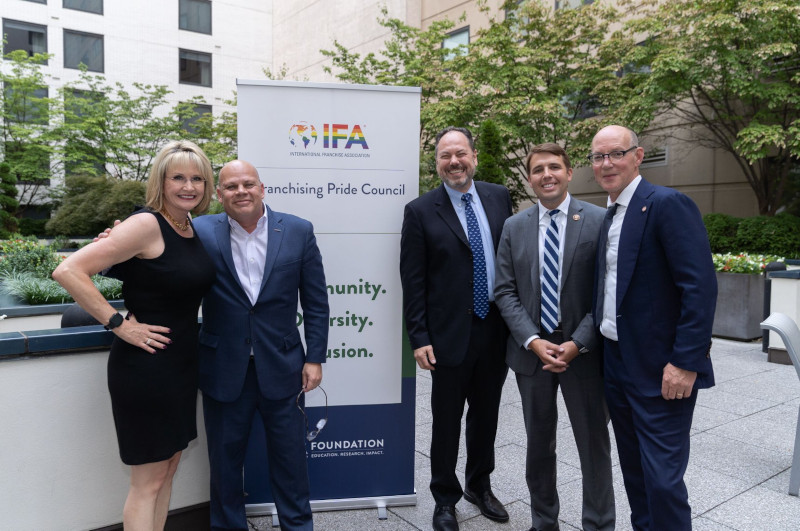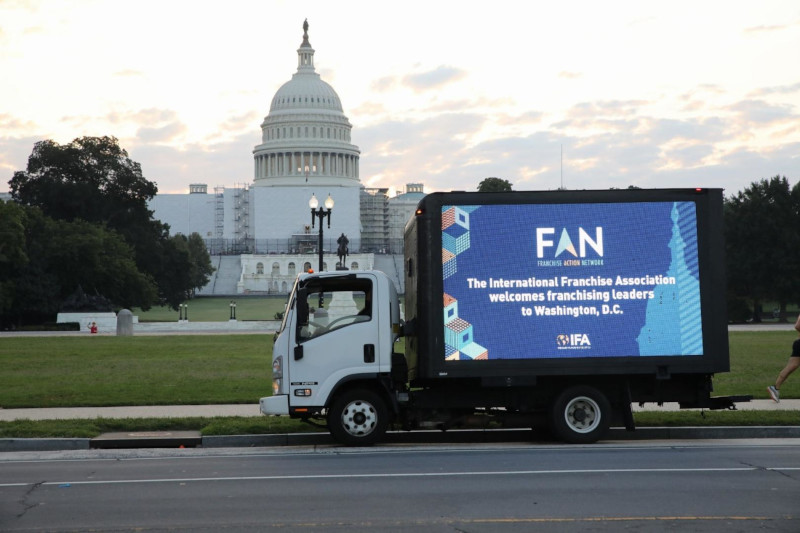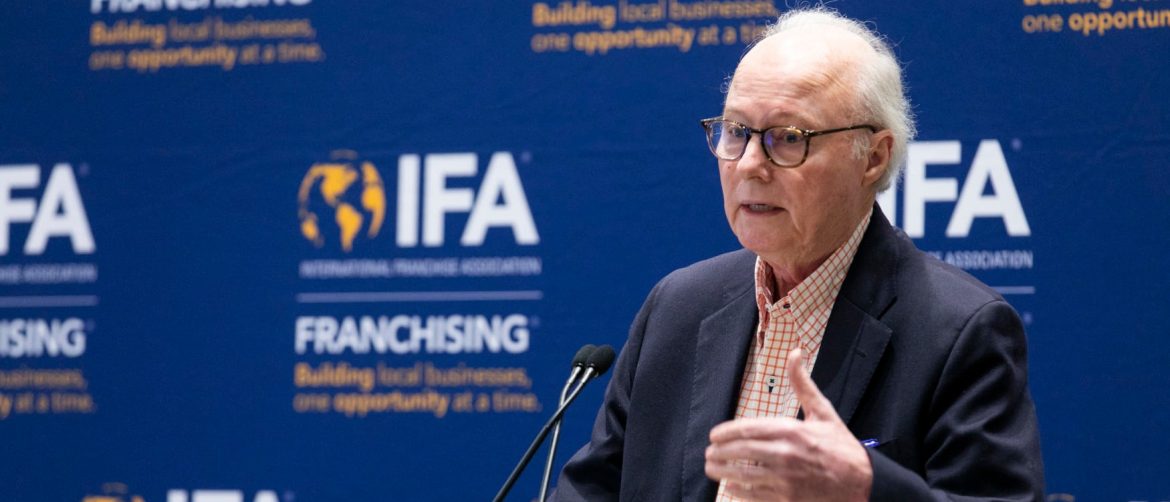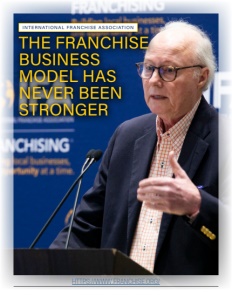International Franchise Association
The Franchise Business Model Has Never Been Stronger
Representing the franchise industry, the International Franchise Association provides the answers through advocacy and education
For over 60 years, the International Franchise Association’s (IFA) primary mission for its members has been to protect, enhance, and promote the franchise business model.
IFA’s membership consists of over 1,300 brands that use the business model. This includes franchise suppliers and anyone doing business with franchisors or franchisees. Nearly 10,000 members are franchise owners who own and operate their businesses within their local communities.
IFA’s role in the protection of franchises is to advocate for the business model and deal directly with government relations, as well as ensure that public policies at both federal, state and international levels create an environment conducive to the franchise model of growth.
“When we talk about enhancing franchising, this is accomplished by hosting and attending networking events, education, and certifications. Activities that we do to improve franchising from within,” says Matthew Haller, President & CEO of the International Franchise Association. When asked how they are raising awareness of the business model for prospective franchisees, IFA answers that they create a platform and space for those individuals who might have the business acumen but don’t know how to get started on their own.
IFA is not a franchise or a franchisee organization but represents the entire franchise business model. Currently, the business model is used by over 300 different industry sectors or business types. Serving both an advocacy and educational role, the IFA has the best interests of its members at the heart of its operating model.

While most individuals associate franchises with restaurants or quick-service establishments (e.g. McDonald’s), these only make up 40% of the business model market. The variation of businesses that utilize franchises is truly endless, encompassing businesses from fitness studios, nail, hair salons, and childcare facilities to plumbing business and pet care services.
“The franchise economy touches people in so many different ways. Franchising is a way to grow enterprises or allow people to own a successful business. It is a completely different way of conducting business and is unique,” says Haller.
Around 20 years ago, the board of directors at IFA made the strategic decision to include franchisees in its membership. This has radically changed the organization’s path to representing the entirety of the business model and shaped its work in educating the public.
A significant component that IFA endeavors to convey to the public is that these businesses are operated by individuals, just like any other small business. The only difference is they have a licensing deal with a more prominent brand.
This public image always needs a complete picture of the business model and the uniqueness of franchising. It’s this core insight that IFA is working to protect via constantly creating educational content for the general public.
However, the simple fact is that not all franchise brands are created equal. As some will be more successful than others, IFA encourages potential franchisees to conduct their own due diligence.
IFA knows this is the best method of avoiding issues that may emerge later in the process.
IFA has an entire Academy of Learning Modules developed for both franchisor and franchisee members.

For franchisors, IFA has developed material that educates them on how to create a franchise system, how to market and sell it, and the legal requirements.
And for prospective franchisees, IFA hosts events around the country, displays at expos, and offers a plethora of online education modules about how to qualify for a franchise purchase.
Haller elaborates on the role that government has in public policy, “We think the appropriate role for government to play is by regulating the franchise business model in a way that creates healthy channels of commerce and supports a relationship that focuses on the appropriate amount of pre-sale disclosure.”
IFA believes that franchises need to be allowed to evolve. Currently, there are levels of autonomy that franchisors offer franchisees with certain elements being left to the discretion of the franchisee, which includes who they hire, their pay rate, schedules, and real estate.
In regards to the outward appearance of the brand to the customer, the licensing relationship is essential as the franchise needs to maintain a consistent look and feel. This being said this is a unique element of the business model.
“By buying into a franchise, you can own and operate a business, or businesses, as opposed to how mega-corporations work, which is the business model’s biggest selling point. All the stakeholders in the franchise relationship benefit from the established brand,” says Haller.
Also, by creating a franchise, you can expand and grow your business with other people’s capital, which in turn means an accelerated rate of market reach. It’s also worth noting that franchisees have local market knowledge and operate in a community. This also allows these individuals to feed their families and uplift communities.
According to research conducted by IFA, franchisees tend to pay higher wages, offer better benefits for workers, make different programs available, and these owners give back to their local communities in more powerful ways compared to other business models.
While the business model is unique, it’s not suited to everyone, so both parties must be informed upfront. Without this clarity, many potentially interested franchisees will leave the opportunity.
Regarding accountability, the franchise is the overarching business owner of the brand. They are separately incorporated, and who the government will refer to if laws are abided by. In the franchise agreement, the franchisee has to follow federal, state, and local laws.
“In states like California, particularly in the area of labor policy, there’s been an attempt to hold the franchise brands (the franchisor) jointly liable for franchisee infringements regarding labor and working conditions.
“If this happens, it will eviscerate the whole rationale for the business model and isn’t fair. Right now, there’s a push from organized labor to make the bigger party in the franchise agreement pay for the infringements of the smaller party,” says Haller.
According to IFA, this has been an ongoing dispute for roughly ten years. Haller firmly believes that labor unions are targeting franchisors as it would help increase their market share of workers in the private sector that they represent.
Franchises form the backbone of the US economy. Within the private sector, franchises provide over 8 million jobs which are associated with 800,000 franchise businesses.
“In 2023, franchise businesses are looking to grow by 2% in new business and 3% in new jobs, led by the restaurant industry, followed by the commercial and residential industries,” says Haller.
Marketing and promotion are important to IFA. Currently, a marketing and communications team promotes policies to elected officials to ensure they hear what’s happening in the franchise landscape. It also ensures that individuals hear about the different conferences and events hosted by the organization, as well as partners who collaborate with IFA.
This focus on marketing and communication is also important for the franchise model, as franchisees buy into a brand ethos that is communicated to the public.
As with all businesses, the pandemic drove faster adoption of technology. In the franchise world, meetings with franchise CEOs and franchisees now take place over Zoom calls, as well as staff training.
During COVID, IFA created its own webinars due to demand. Now IFA has an entire online community, the IFA Academy, where franchise professionals can access classes to make them better players.
A recently revitalized certification is the Certified Franchise Executive (CFE™) program, which was compiled in partnership with the University of Louisville. The six-week curriculum is conducted online in 25-person, instructor-led classes. At the end of the course, individuals are Certified Franchise Executives through IFA and the University of Louisville’s Global Center of Franchise Excellence.
“This has been a game changer in the professional development and education in the franchise channels,” says Haller.
Haller argues that there is no replacement for developing relationships in person.
“Franchisors are still doing lots of in-person meetings and training, but the technology element has met the opportunity of educating on demand by creating online educational modules that allow vendors to acclimatize to guidelines at their own speed,” says Haller.
There were a number of issues associated with COVID, namely supply chain problems and labor shortages.
With regard to supply chain problems, franchises were able to buck those trends by securing stock for their franchisees.
While in labor shortages, franchises that pay their employees a premium wage have faired better than those that don’t. But it has still been a challenge for many franchises to find quality labor.
This being said, the push for technological solutions has meant many franchise outlets require less labor – especially in the restaurant industry. Whether it’s via the use of third-party apps, smaller dining rooms, or more drive-throughs, the investment into new technologies has lowered the overall requirement for labor.
IFA is also represented by regional groups called Franchise Business Networks that gather and host events in their communities. Currently, there are 40 of these networks operational across the county.
Moving into the second half of 2023, IFA’s main focus is to ensure that its strong membership base is supported while continuing to create events that educate and promote the business model and liaising with the government to ensure policymakers understand how the business model works and why we need policies that support it, not bring it harm.
Overall, Haller summarizes that the franchise business model has never been stronger.
AT A GLANCE
International Franchise Association
What: The association that advocates, educates, and guides its members in the ever-growing franchise industry
Where: Washington, DC
Website: https://www.franchise.org/



